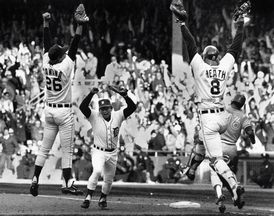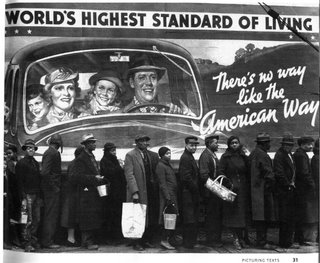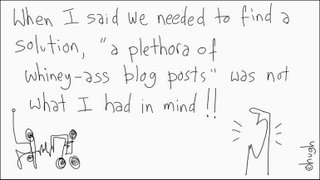Part of my job is to produce mailing lists of our membership. People requesting those lists sometimes have questions, and as a cubicle slave I must always have answers. I tried to put together a useful FAQ, but that effort lasted about twenty seconds and turned into this mess.
Q: What’s a member?
A: They generally reside between the legs of the male of the species. Why so many of them have joined the WSBA is difficult to explain. I try not to get into motivations.
Q: How can I get what I want?
A: Lower your expectations. Happy yet? Yes: stop. No: repeat.
Q: This count is too high/low. What happened?
A: I may have screwed it up, but it’s unlikely. I can do these damned things in my sleep, and the odds that I messed it up are pretty small. Perhaps you were ambiguous in your request. Perhaps you thought you requested one thing, but in fact you requested something else. Please check your request and assumptions before you ask me to check mine.
Q: I really need this right away. Can you rush it for me?
A: Yes, but it really annoys me when you do shit like that. I understand that things can get misplaced and deadlines can creep up on you, but you are getting paid to handle that kind of crap so please do. I’ll bail your ass out if you’re in a bind, but don’t make a habit out of it. I will whine to the authorities eventually.
Wednesday, May 31, 2006
Tuesday, May 30, 2006
Karl version 2006.05
Saturday, May 27, 2006
Could it be 1987? NO!!! (a fact checking moment)
On Friday night (yesterday) after the Tigers beat the Cleveland Indians and improved their MLB best record to 34-14 the Tiger manager spied a fan holding a sign. The sign read, "When do playoff tickets go on sale?" A veteran of 15 seasons as a manager Jim Leyland knew the guy was getting a bit over excited. The chain-smoking Leyland said, "My cigarettes have filters on them. I don't think that guy's did."
That guy could have been me on Friday when I wrote about the Tigers reaching 19 games over .500. I assured you, loyal reader, that the Tigers had last reached that lofty height in their last playoff year, 1987. Perhaps I got a contact buzz from all the BC bud in the area. I was just plain wrong. Wrong. Wrong. Wrong. Wrong. Wrong. The Tigers were an impressive 23 games above .500 in 1988.
Why didn't I notice? I only looked that their final record that year: 88-74. A good year, but only 14 games over .500. What happen? The 1988 Tigers were indeed a robust 73-50 on August 21st, and then the roof caved in. They won only three of their next 23 games including a 17 inning loss to the Yankees on September 11th. They finished the season with a respectable run of 11-5, but still finished one game behind Boston for the AL East crown. It was probably for the best since Boston got hammered by Oakland in the ALCS four games to none. Oakland in turn was roughed up by the Dodgers in the World Series which featured former Tiger Kirk Gibson's now famous home run in game one.
Lessons learned:
1) Check your damned facts better!
2) No matter how promising things may appear, the roof can cave in at any time.
3) There's not a whole lot that's good about September 11th.
4) The Tiger's really missed Gibby that year.
By the way, the Tigers won again today. They are 35-14, have a 3.5 game lead on the White Sox, have won 15 of their last 16 games, and will break my heart at any moment now.
That guy could have been me on Friday when I wrote about the Tigers reaching 19 games over .500. I assured you, loyal reader, that the Tigers had last reached that lofty height in their last playoff year, 1987. Perhaps I got a contact buzz from all the BC bud in the area. I was just plain wrong. Wrong. Wrong. Wrong. Wrong. Wrong. The Tigers were an impressive 23 games above .500 in 1988.
Why didn't I notice? I only looked that their final record that year: 88-74. A good year, but only 14 games over .500. What happen? The 1988 Tigers were indeed a robust 73-50 on August 21st, and then the roof caved in. They won only three of their next 23 games including a 17 inning loss to the Yankees on September 11th. They finished the season with a respectable run of 11-5, but still finished one game behind Boston for the AL East crown. It was probably for the best since Boston got hammered by Oakland in the ALCS four games to none. Oakland in turn was roughed up by the Dodgers in the World Series which featured former Tiger Kirk Gibson's now famous home run in game one.
Lessons learned:
1) Check your damned facts better!
2) No matter how promising things may appear, the roof can cave in at any time.
3) There's not a whole lot that's good about September 11th.
4) The Tiger's really missed Gibby that year.
By the way, the Tigers won again today. They are 35-14, have a 3.5 game lead on the White Sox, have won 15 of their last 16 games, and will break my heart at any moment now.
Friday, May 26, 2006
Could it be... 1987?

I’ve been busting my buttons about the Tigers so far this year. After the abusive relationship I’ve had with the franchise for the past 13 years I am still waiting for reality to deliver a smack upside my head. “This time it will be different,” the Tigers tell me. “This time I’ve really changed.” Yeah, right. I’ve heard that before, but like the battered spouse that I am I’ll keep taking them back. I keep hoping that it’s for real this time. I believe because it’s too heart-breaking not to. No doubt the heart-break will come again, but at least for now there is hope. We suffer though seemingly endless bad days to bask in the warmth of these precious few good days. Maybe it’s because I grew with those endless Michigan winters.
Yesterday the Tigers finished a four game sweep in Kansas City with a come from behind victory. They have the best record in the majors (33-14), and for the first time since 1987 they are 19 games above .500. Everyone who is a Tiger fan knows the significance of 1987. 1987 is that last year the Tigers made the playoffs. WE WILL NOT TALK ABOUT WHAT HAPPENED AFTER THE REGULAR SEASON ENDED, but the Tigers had the best record in the majors that year at 98-64 (34 games above .500) and appeared to be back in the form that had netted them a World Series championship three years earlier.
Again the Tigers have the best record in baseball (albeit only the end of May), but there’s one number that sticks in my head: .479. That number is the combined winning percentage of all the teams they have played this year at the time the Tigers played them. It ranks 26th out of 30. The White Sox, who are only 1.5 games behind the Tigers, are ranked 30th at .456. In other words, the Tigers and the ChiSox have been playing soft schedules. Clearly I’m not the only one who has noticed this piece of trivia. ESPN.com’s power rankings for May 26th had this to say about the Tigers:
Power Rankings: Hold those Tigers ... at No. 2
Yesterday the Tigers finished a four game sweep in Kansas City with a come from behind victory. They have the best record in the majors (33-14), and for the first time since 1987 they are 19 games above .500. Everyone who is a Tiger fan knows the significance of 1987. 1987 is that last year the Tigers made the playoffs. WE WILL NOT TALK ABOUT WHAT HAPPENED AFTER THE REGULAR SEASON ENDED, but the Tigers had the best record in the majors that year at 98-64 (34 games above .500) and appeared to be back in the form that had netted them a World Series championship three years earlier.
Again the Tigers have the best record in baseball (albeit only the end of May), but there’s one number that sticks in my head: .479. That number is the combined winning percentage of all the teams they have played this year at the time the Tigers played them. It ranks 26th out of 30. The White Sox, who are only 1.5 games behind the Tigers, are ranked 30th at .456. In other words, the Tigers and the ChiSox have been playing soft schedules. Clearly I’m not the only one who has noticed this piece of trivia. ESPN.com’s power rankings for May 26th had this to say about the Tigers:
Power Rankings: Hold those Tigers ... at No. 2
What more does a team need to do? Yes, the Detroit Tigers have baseball's best record. Yes, they are hotter than "American Idol" Taylor Hicks. Yes, they've won 13 of their last 14. Yes, they own baseball's top pitching staff. Yes, yes and yes again.
But no, they are not the No. 1 team in this week's ESPN.com Power Rankings. Not yet. We're not trying to toss Simon Cowell's wet blanket on the Tigers' performance. We just need to see it to believe it, and the Tigers' time will come June 6 when they visit Chicago for a little AL Central showdown with the pole-sitting White Sox. Until then, they'll likely remain in the two-hole barring a major collapse for either team. Both teams just completed stellar weeks (5-1 for Chicago, 6-1 for Detroit).
I don't think it's really fair to wait until the June 6th showdown with the ChiSox. All that soft schedule stuff changes for the Tigers starting tonight. Tonight the Tigers start what my Tiger-fan buddies and I have been calling The Stretch. Over the next two and a half weeks the Tigers will exclusively play the best teams in the American League. It starts with a ten game home stand against the Indians (23-23), the Yankees (26-19), and the Red Sox (27-18). Then the Tigers hit the road for six games against the White Sox (31-15) and the Blue Jays (25-21). How the Tigers fair during this 16 game stretch might define them for the rest of the season. Will the nice, early season run come to an abrupt end as it did in 1993 with a ten game losing streak? Will the Tigers step up and claim a position among the elite in the American League? I’ll get back to you about it 16 games from now.
Tuesday, May 23, 2006
Bill Hicks: bridged the gap between Lenny Bruce and Stephen Colbert

Some of the best advice is spray painted on walls. I couldn't agree more with this idea.
If you're willing to take advice from a wall (and me) here's a good start, and here's part II of a good start. I haven't been able to find the rest of this documentary (called Totally Bill Hicks), but I'm sure someone is willing to sell it to you. YouTube has no shortage of clips from Bill's stand-up routines and talk show visits. One of my favorites is this interview in the UK. It's short but insightful, and I love his closing line.
Friday, May 05, 2006
Is the American Dream just a dream?

The Center for American Progress has just released a report about economic mobility in the United States. The report, titled Understanding Mobility in America, makes the following summary statements.
- Children from low-income families have only a 1 percent chance of reaching the top 5 percent of the income distribution, versus children of the rich who have about a 22 percent chance.
- Children born to the middle quintile of parental family income ($42,000 to $54,300) had about the same chance of ending up in a lower quintile than their parents (39.5 percent) as they did of moving to a higher quintile (36.5 percent). Their chances of attaining the top five percentiles of the income distribution were just 1.8 percent.
- Education, race, health and state of residence are four key channels by which economic status is transmitted from parent to child.
- African American children who are born in the bottom quartile are nearly twice as likely to remain there as adults than are white children whose parents had identical incomes, and are four times less likely to attain the top quartile.
- The difference in mobility for blacks and whites persists even after controlling for a host of parental background factors, children’s education and health, as well as whether the household was female-headed or receiving public assistance.
- After controlling for a host of parental background variables, upward mobility varied by region of origin, and is highest (in percentage terms) for those who grew up in the South Atlantic and East South Central regions, and lowest for those raised in the West South Central and Mountain regions.
- By international standards, the United States has an unusually low level of intergenerational mobility: our parents’ income is highly predictive of our incomes as adults. Intergenerational mobility in the United States is lower than in France, Germany, Sweden, Canada, Finland, Norway and Denmark. Among high-income countries for which comparable estimates are available, only the United Kingdom had a lower rate of mobility than the United States.
Key findings relating to short-run, year-to-year income movements include the following: - The overall volatility of household income increased significantly between 1990-91 and 1997-98 and again in 2003-04.
- Since 1990-91, there has been an increase in the share of households who experienced significant downward short-term mobility. The share that saw their incomes decline by $20,000 or more (in real terms) rose from 13.0 percent in 1990-91 to 14.8 percent in 1997-98 to 16.6 percent in 2003-04.
- The middle class is experiencing more insecurity of income, while the top decile is experiencing less. From 1997-98 to 2003-04, the increase in downward short-term mobility was driven by the experiences of middle-class households (those earning between $34,510 and $89,300 in 2004 dollars). Households in the top quintile saw no increase in downward short-term mobility, and households in the top decile ($122,880 and up) saw a reduction in the frequency of large negative income shocks.
- For the middle class, an increase in income volatility has led to an increase in the frequency of large negative income shocks, which may be expected to translate to an increase in financial distress.
- The median household was no more upwardly mobile in 2003-04, a year when GDP grew strongly, than it was it was during the recession of 1990-91.
Upward short-term mobility for those in the bottom quintile has improved since 1990-91, with no significant offsetting increase in downward short-term mobility. - Households whose adult members all worked more than 40 hours per week for two years in a row were more upwardly mobile in 1990-91 and 1997-98 than households who worked fewer hours. Yet this was not true in 2003-04, suggesting that people who work long hours on a consistent basis no longer appear to be able to generate much upward mobility for their families.
Is the US the land of opportunity? Yes, but not as much as our so-called socialist allies in Europe.
Wednesday, May 03, 2006
Cato Institute: Bush 'sharply at odds' with Constitution

Nobody can accuse the Cato Institute of being part of the loony left. Yesterday the libertarian think tank released its assessment of George W. Bush’s relationship with the legal document he swore to protect: the US Constitution. Titled Power Surge, the document summarizes how the Bush White House is, "sharply at odds with the text, history, and structure of the Constitution, which authorizes a government of limited powers."
Honestly, anyone who still supports this President has completely lost touch with what is healthy for our republic. Rummy called the insurgency in Iraq a group of “dead-enders.” The real dead-enders are the people in this country who don’t want to see Bush’s time in the oval office end as soon as possible.
Tuesday, May 02, 2006
TO: The Emperor RE: Your Clothes

You have to see it to believe it. The Washington DC press corps has been licking the Presidents boots for so long that they have forgotten what really good, biting satire feels, smells or tastes like. Stephen Colbert reminded them. Colbert rubbed their noses in it. It was a thing of beauty and long overdue.
The 92nd annual dinner for the White House Correspondents' Association was intended to be what the event has always been: a non-event. The well fed media get to bask in the aura of the President and all the other DC muckity-mucks, and pat each other on the back for another year of abysmal reporting. Someone forgot to include that agenda in Stephen Colbert’s invitation. He not only blasted Bush (who was sitting just feet away from the podium), he delivered scathing assaults on everyone in the room: Scott McClellan, Justice Scalia, and (most pointedly) the DC press corps. He definitely got Dubya's goat.
The laugher was tentative and nervous, and the room frequently went completely quiet (except – to his credit – Justice Scalia who had a good gut laugh at his own expense). The response in the room, however, was cacophonous compared the response by the media itself which essentially ignored the story until today.
Already a Thank You Stephen Colbert web site has sprung up. Over 28,000 people have said their ‘thank you’s to Stephen by the time I made this post.
Image © Salon.com
Subscribe to:
Comments (Atom)

